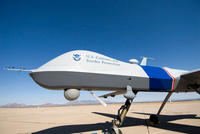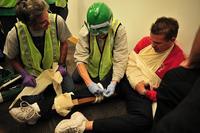-
U.S. confirms: Assad used chemical weapons against Syrian rebels, civilians (updated)

The Obama administration has informed Congress a few minutes ago that the U.S. intelligence community has determined that the Assad regime has used chemical weapons on several occasions against both rebel forces and Syrian civilians. The U.S. intelligence community says these attacks, each using small quantities of sarin gas, have killed about 150 Syrians. The president’s deputy national security adviser, Ben Rhodes, told reporters that the president had decided to provide “direct military support” to the opposition. Rhodes said the U.S. military assistance to the rebels would be different in “both scope and scale” from what had been authorized before, which included non-lethal equipment such as night-vision goggles and body armor.
-
-
Justice Department endorses NYPD’s stop-and-frisk

The Justice Department (DOJ) has entered the debate on the New York Police Department’s stop-and-frisk policy, telling a federal judge that DOJ endorses the program as long as there is independent oversight to monitor changes in the policy if civil rights violations occur.
-
-
Environmental group sues State Department for Keystone XL-related files
The Sierra Club has announced it is suing the State Department for files related to an environmental review draft of the Keystone XL pipeline. The group tried to gain access to the files through the Freedom of Information Act, but the request was denied, so the group filed the suit on Monday in the U.S. District Court in the Northern District of California.
-
-
U.S. confirms: Assad used chemical weapons against Syrian rebels, civilians
The Obama administration has informed Congress a few minutes ago that the U.S. intelligence community has determined that the Assad regime has used chemical weapons on several occasions against both rebel forces and Syrian civilians. The U.S. intelligence community says these attacks, each using small quantities of sarin gas, have killed about 150 Syrians.
-
-
NSA director: surveillance programs prevented “dozens” of terror attacks
Gen. Keith Alexander, the director of the National Security Agency (NSA) and commander of the U.S. Cyber Command, told lawmakers yesterday (Wednesday) that the NSA’s electronic surveillance programs have been indispensable in thwarting “dozens” of terrorist attacks on targets in the United States and abroad. He told the senators that securing a “cyber arena” could be done without infringing upon the privacy rights of Americans. “We do not see a tradeoff between security and liberty,” Alexander said, later adding, “We are trying to protect Americans.”
-
-
Al Qaeda-affiliated militants training in using shoulder-fired anti-aircraft missile

A Xerox copy of a 26-page manual with instructions on how to use man-portable air-defense systems, or MANPADS – also called SA-7 — was found in a building in Timbuktu in North Mali which was used by Al Qaeda in the Islamic Maghreb operatives during the 8-month control – April 2012 to February 2013 — of the area by Islamist militants. The Libyan military under Col. Qaddafi had about 15,000 SA-7s, but after the Qaddafi regime fell in November 2011, NATO forces and Libyan militias loyal to the government gained possession of only 5,000 of them. The rest have disappeared into the arsenals of different militias, and have probably found their way to different terrorist organizations in North Africa and the Middle East.
-
-
Defense companies turn their attention to border security

The U.S. involvement in the Iraq war is over, and the country will soon withdraw its troops from Afghanistan. Federal budgets cuts shrink agencies’ ability to conduct research and development. Faced with these realities, military contractors have begun to focus on border security. What many defense companies find especially appealing is the fact that the Senate immigration bill conditions any move toward legalizing the status of more than eleven million illegal immigrants in the United States on the strengthening of security along the U.S.-Mexico border.
-
-
U.S. cities preparing for disasters

In the last year the United States, among other challenges, faced Hurricane Sandy, the Sandy Hook shooting, the Boston Marathon bombings, and Tornadoes in Oklahoma. The future is unpredictable, so cites across the United States are taking steps to be in a better position to respond to disasters.
-
-
Fast, reliable identification of pathogens
Life-threatening bacterial infections cause tens of thousands of deaths every year in North America, but current methods of culturing bacteria in the lab can take days to report the specific source of the infection, and even longer to pinpoint the right antibiotic that will clear the infection. Researchers have created an electronic chip that can analyze blood and other clinical samples for infectious bacteria with record-breaking speed.
-
-
House panel to unveil cybersecurity bill
Republicans on the House Homeland Security Committee are close to finalizing a long-awaited cybersecurity bill, following extensive discussions with private companies.The bill formally establishes DHS’s already-operating National Cybersecurity and Communications Integration Center, to circulate cyberthreat and vulnerability data.
-
-
ACLU files lawsuit challenging NSA's phone surveillance
In the wake of the past week’s revelations about the NSA’s surveillance of phone calls, the yesterday American Civil Liberties Union (ACLU) filed a lawsuit charging that the program violates Americans’ constitutional rights of free speech, association, and privacy.
-
-
Cloud computing user privacy needs serious reform: scholars
When Web surfers sign up for a new online service or download a Web application for their smartphone or tablet, the service typically requires them to click a seemingly innocuous box and accept the company’s terms of service and privacy policy. Agreeing to terms without reading them beforehand, however, can adversely affect a user’s legal rights, says a new paper by an expert in technology and legal issues.
-
-
NIST publishes draft cloud computing security document for comment
The National Institute of Standards and Technology (NIST) has published a draft document on security for cloud computing as used in the federal government. The public comment period runs through 12 July 2013.
-
-
White House to conduct urgent, comprehensive review of U.S. Syria policy
The White House today and tomorrow is conducting an urgent, and comprehensive, review of U.S. Syria policy, with a major policy announcement expected Wednesday or Thursday. The urgency is the result of changes on the battlefield. Bolstered with thousands of Hezbollah fighters, growing financial support from Iran and Iraq, around-the-clock arms shipments from Iran and Syria, and more direct Iranian involvement in overseeing the regime’s military operations, the Assad government has been able to turn the tide of war in its favor. Senior administration officials believe that arming the rebels may no longer be sufficient to reverse the Assad government’s gains unless the United States takes additional, and more direct, steps like carrying out airstrikes against Syrian forces.
-
-
Lawmakers criticize NSA leaker Edward Snowden

Lawmakers were quick to criticize Edward Snowden, the 29-year old Booz Allen Hamilton employee who disclosed the NSA surveillance program to the Guardian and the Washington Post. House Intelligence Committee chairman Mike Rogers (R-Michigan) said the national security leaks would endanger American lives. Peter King (R-New York), chairman of the Homeland Security subcommittee on Counterintelligence and Terrorism, said of the leaks: “This is a matter of extraordinary consequence to American intelligence.”
-
More headlines
The long view
Factories First: Winning the Drone War Before It Starts
Wars are won by factories before they are won on the battlefield,Martin C. Feldmann writes, noting that the United States lacks the manufacturing depth for the coming drone age. Rectifying this situation “will take far more than procurement tweaks,” Feldmann writes. “It demands a national-level, wartime-scale industrial mobilization.”
No Nation Is an Island: The Dangers of Modern U.S. Isolationism
The resurgence of isolationist sentiment in American politics is understandable but misguided. While the desire to refocus on domestic renewal is justified, retreating from the world will not bring the security, prosperity, or sovereignty that its proponents promise. On the contrary, it invites instability, diminishes U.S. influence, and erodes the democratic order the U.S. helped forge.
Fragmented by Design: USAID’s Dismantling and the Future of American Foreign Aid
The Trump administration launched an aggressive restructuring of U.S. foreign aid, effectively dismantling the United States Agency for International Development (USAID). The humanitarian and geopolitical fallout of the demise of USAID includes shuttered clinics, destroyed food aid, and China’s growing influence in the global south. This new era of American soft power will determine how, and whether, the U.S. continues to lead in global development.
Water Wars: A Historic Agreement Between Mexico and US Is Ramping Up Border Tension
By Natasha Lindstaedt
As climate change drives rising temperatures and changes in rainfall, Mexico and the US are in the middle of a conflict over water, putting an additional strain on their relationship. Partly due to constant droughts, Mexico has struggled to maintain its water deliveries for much of the last 25 years, deliveries to which it is obligated by a 1944 water-sharing agreement between the two countries.
How Disastrous Was the Trump-Putin Meeting?
In Alaska, Trump got played by Putin. Therefore, Steven Pifer writes, the European leaders and Zelensky have to “diplomatically offer suggestions to walk Trump back from a position that he does not appear to understand would be bad for Ukraine, bad for Europe, and bad for American interests. And they have to do so without setting off an explosion that could disrupt U.S.-Ukrainian and U.S.-European relations—all to the delight of Putin and the Kremlin.”
How Male Grievance Fuels Radicalization and Extremist Violence
By Haily Tran
Social extremism is evolving in reach and form. While traditional racial supremacy ideologies remain, contemporary movements are now often fueled by something more personal and emotionally resonant: male grievance.
